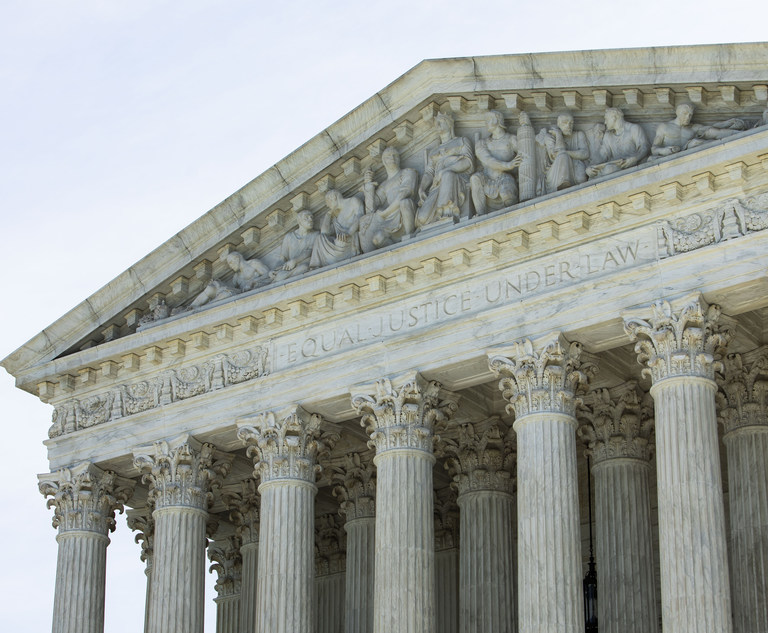 U.S. Supreme Court building on Tuesday, April 23, 2019.
U.S. Supreme Court building on Tuesday, April 23, 2019. Rare Decision Holding a Forfeiture Order To Be Constitutionally Excessive May Provide Roadmap for Future Challenges
The potential implications of Judge Rakoff's ruling are such that the Government has already indicated its intention to take an exceedingly rare affirmative appeal.
December 03, 2021 at 02:00 PM
9 minute read
While the U.S. Supreme Court has held that a "punitive" forfeiture order may constitute a constitutionally excessive fine "if it is grossly disproportional to the gravity of a defendant's offense," United States v. Bajakajian, 524 U.S. 321, 334 (1998)—and while the Second Circuit has since articulated various factors for courts to consider in evaluating whether an order of forfeiture is "grossly disproportional," United States v. Viloski, 814 F.3d 104 (2d Cir. 2016)—defendants have not historically been successful in challenging an otherwise properly calculated forfeiture order as constitutionally excessive.
That may be about to change. In what appears to be a first, Judge Jed S. Rakoff issued an opinion this fall in which he (1) agreed the Government had met its burden of establishing a multi-million forfeiture obligation under the applicable statute, but (2) applying the Viloski factors found such an order would be "grossly disproportional" to the defendant's offense and thus declined to enter it. United States v. Akhavan, 2021 U.S. Dist. LEXIS 16387, at *3 (S.D.N.Y. Aug. 30, 2021). The decision—and the reasoning behind it—may provide a potential roadmap for defendants considering challenging forfeiture orders as unconstitutionally excessive going forward. Indeed, the potential implications of Judge Rakoff's ruling are such that the Government has already indicated its intention to take an exceedingly rare affirmative appeal.
This content has been archived. It is available through our partners, LexisNexis® and Bloomberg Law.
To view this content, please continue to their sites.
Not a Lexis Subscriber?
Subscribe Now
Not a Bloomberg Law Subscriber?
Subscribe Now
NOT FOR REPRINT
© 2025 ALM Global, LLC, All Rights Reserved. Request academic re-use from www.copyright.com. All other uses, submit a request to [email protected]. For more information visit Asset & Logo Licensing.
You Might Like
View All
Prosecutors Ask Judge to Question Charlie Javice Lawyer Over Alleged Conflict

Manhattan DA Says Trump's Ongoing State and Federal Appeals Are Now Moot

Read the Document: DOJ Releases Ex-Special Counsel's Report Explaining Trump Prosecutions
3 minute readLaw Firms Mentioned
Trending Stories
Who Got The Work
J. Brugh Lower of Gibbons has entered an appearance for industrial equipment supplier Devco Corporation in a pending trademark infringement lawsuit. The suit, accusing the defendant of selling knock-off Graco products, was filed Dec. 18 in New Jersey District Court by Rivkin Radler on behalf of Graco Inc. and Graco Minnesota. The case, assigned to U.S. District Judge Zahid N. Quraishi, is 3:24-cv-11294, Graco Inc. et al v. Devco Corporation.
Who Got The Work
Rebecca Maller-Stein and Kent A. Yalowitz of Arnold & Porter Kaye Scholer have entered their appearances for Hanaco Venture Capital and its executives, Lior Prosor and David Frankel, in a pending securities lawsuit. The action, filed on Dec. 24 in New York Southern District Court by Zell, Aron & Co. on behalf of Goldeneye Advisors, accuses the defendants of negligently and fraudulently managing the plaintiff's $1 million investment. The case, assigned to U.S. District Judge Vernon S. Broderick, is 1:24-cv-09918, Goldeneye Advisors, LLC v. Hanaco Venture Capital, Ltd. et al.
Who Got The Work
Attorneys from A&O Shearman has stepped in as defense counsel for Toronto-Dominion Bank and other defendants in a pending securities class action. The suit, filed Dec. 11 in New York Southern District Court by Bleichmar Fonti & Auld, accuses the defendants of concealing the bank's 'pervasive' deficiencies in regards to its compliance with the Bank Secrecy Act and the quality of its anti-money laundering controls. The case, assigned to U.S. District Judge Arun Subramanian, is 1:24-cv-09445, Gonzalez v. The Toronto-Dominion Bank et al.
Who Got The Work
Crown Castle International, a Pennsylvania company providing shared communications infrastructure, has turned to Luke D. Wolf of Gordon Rees Scully Mansukhani to fend off a pending breach-of-contract lawsuit. The court action, filed Nov. 25 in Michigan Eastern District Court by Hooper Hathaway PC on behalf of The Town Residences LLC, accuses Crown Castle of failing to transfer approximately $30,000 in utility payments from T-Mobile in breach of a roof-top lease and assignment agreement. The case, assigned to U.S. District Judge Susan K. Declercq, is 2:24-cv-13131, The Town Residences LLC v. T-Mobile US, Inc. et al.
Who Got The Work
Wilfred P. Coronato and Daniel M. Schwartz of McCarter & English have stepped in as defense counsel to Electrolux Home Products Inc. in a pending product liability lawsuit. The court action, filed Nov. 26 in New York Eastern District Court by Poulos Lopiccolo PC and Nagel Rice LLP on behalf of David Stern, alleges that the defendant's refrigerators’ drawers and shelving repeatedly break and fall apart within months after purchase. The case, assigned to U.S. District Judge Joan M. Azrack, is 2:24-cv-08204, Stern v. Electrolux Home Products, Inc.
Featured Firms
Law Offices of Gary Martin Hays & Associates, P.C.
(470) 294-1674
Law Offices of Mark E. Salomone
(857) 444-6468
Smith & Hassler
(713) 739-1250







